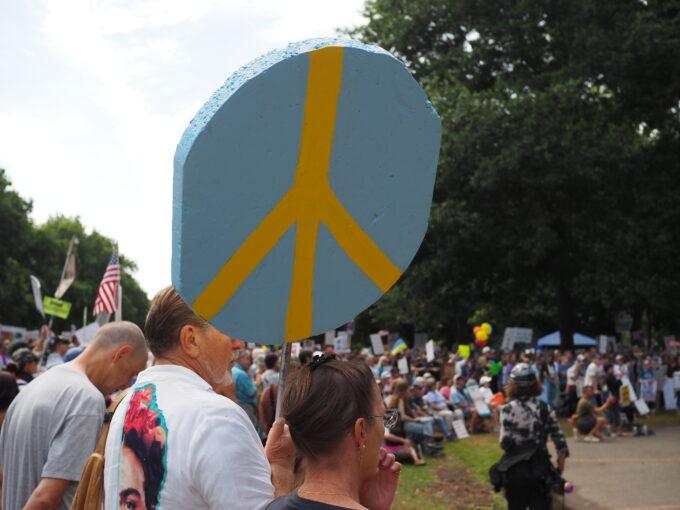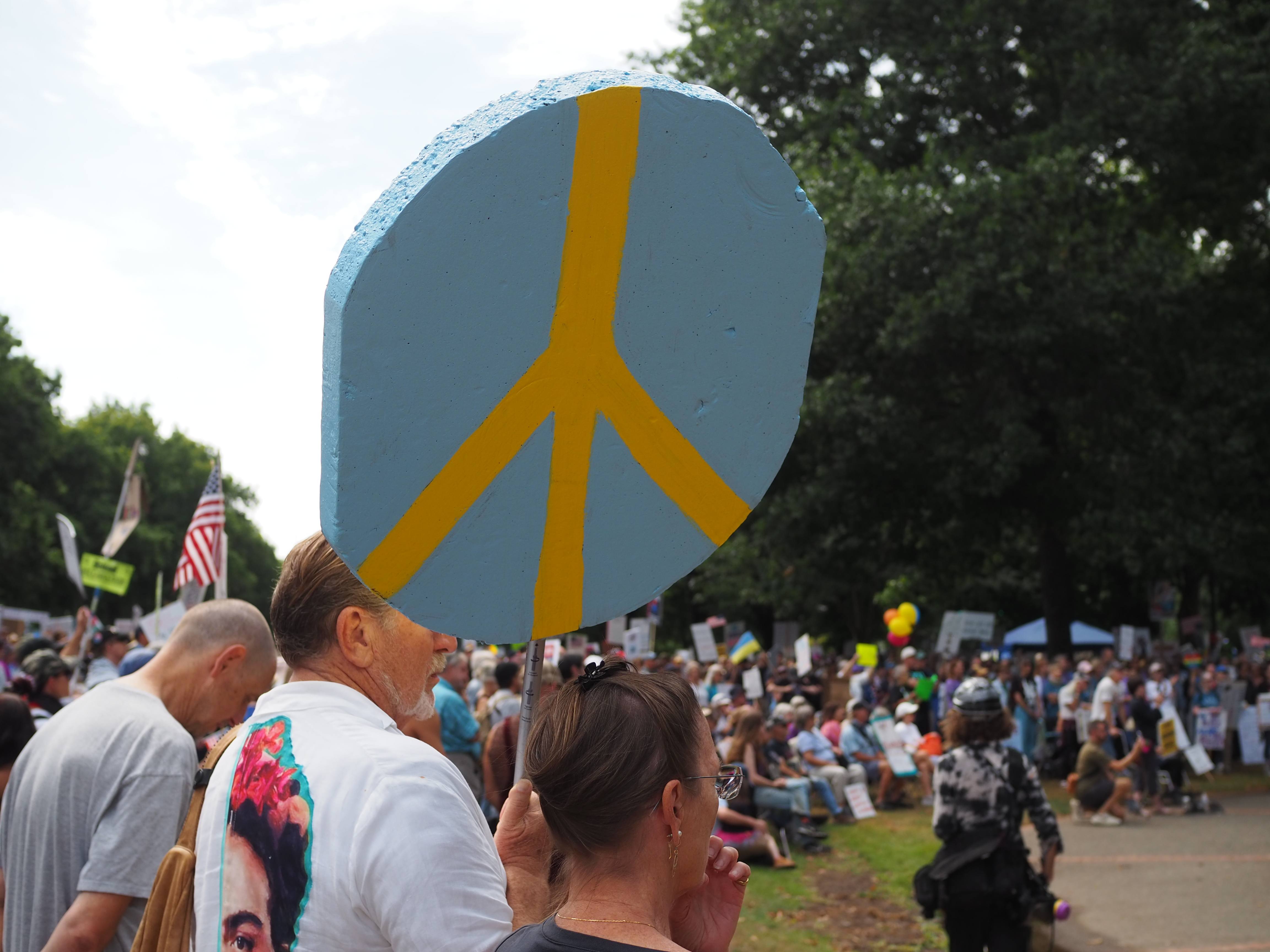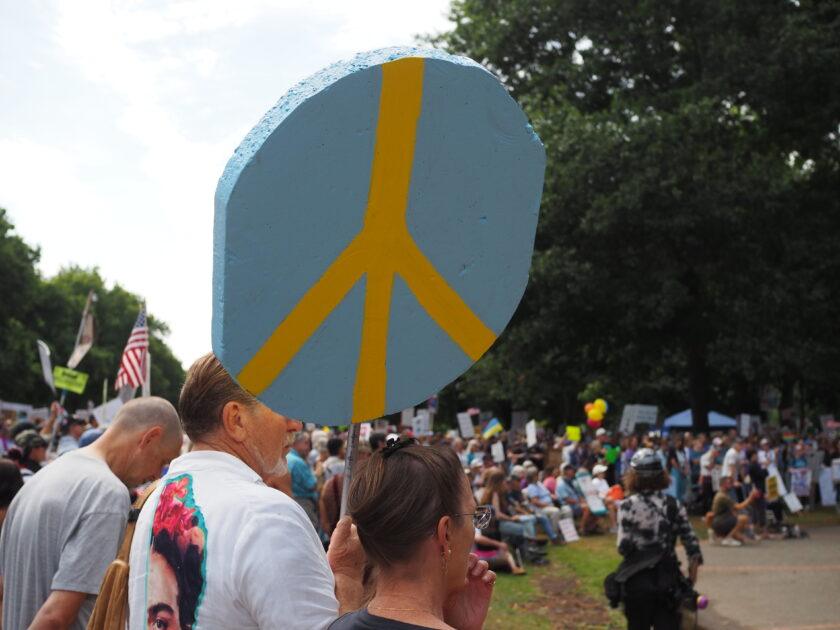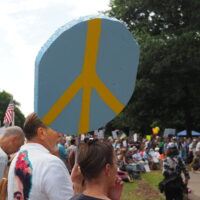Photograph by Nathaniel St. Clair
It has become a ritual of American politics: Donald Trump strides onto the global stage, proclaims himself the indispensable dealmaker, and promises to end wars with the flourish of a handshake. The latest act in this familiar drama is his attempt to position himself as the peacemaker between Russian President Vladimir Putin and Ukrainian leader Volodymyr Zelensky. Yet the spectacle unfolding in Alaska, Washington, and beyond reveals less about peace than about Trump’s peculiar brand of transactional diplomacy, which mistakes surrender for settlement and optics for substance.
Trump’s admirers hail him as a natural peacemaker because he “defers to diplomacy first.” That sounds persuasive until one recalls his record. The Abraham Accords, so frequently invoked, did not resolve a conflict but merely formalized ties between states never at war. His recent “peace deal” between Azerbaijan and Armenia, signed at the White House in August 2025, is being celebrated as historic, but critics warn it may prove fragile, driven more by optics and strategic realignment than durable reconciliation. Even the much-touted summitry with Kim Jong-un yielded little more than photo-ops beneath North Korean flags.
Trump’s admirers often confuse publicity with progress. In Ukraine, where more than 10 million people have been displaced and the World Bank estimates damages exceeding $486 billion as of mid-2025, the stakes are far too grave for theatrics. A quick fix that legitimizes Russian land grabs would not end the war. It would incorporate a war crime into the map of Europe, guaranteeing future conflagrations.
Putin knows this well. His calculus has always been long-term. By contrast, Trump is notoriously impatient. In Alaska, Putin secured validation without conceding a ceasefire. Trump’s threats of new sanctions evaporated, just when Russia’s economy—contracting by 3.4 percent in the second quarter of 2025, according to Moscow’s own statistics—was beginning to feel the strain. This asymmetry between Putin’s endurance and Trump’s craving for immediate deals is a recipe for capitulation dressed up as compromise. Putin once remarked that the war “would never have happened” if Trump had been president. Perhaps he is right, but not because Trump inspires deterrence. Rather, Putin recognizes in Trump a leader eager to reward brute force with political concessions. For Moscow, that is the best peace imaginable: victory without accountability.
Trump’s defenders, echoing Kremlin talking points, dismiss Zelensky as “corrupt” and expendable. Certainly, Zelensky is no saint. His popularity has dipped from wartime highs, and questions about governance abound. Yet to reduce him to a caricature is to ignore the reality that Ukraine’s resilience has been astonishing. Despite battlefield exhaustion, Kyiv still controls roughly 80 percent of its pre-2022 territory, and Ukrainian forces have repeatedly disrupted Russia’s energy infrastructure deep inside its borders. Undermining Zelensky while flattering Putin not only tilts the negotiating table but also signals to other would-be aggressors—from the South China Sea to the Caucasus—that democracy counts for little when set against autocratic might.
History offers chilling echoes. In 1938, Neville Chamberlain returned from Munich declaring “peace for our time,” having handed Hitler part of Czechoslovakia in exchange for promises soon broken. Today, Trump flirts with urging Ukraine to cede not just Crimea, annexed in 2014, but also Donetsk, Luhansk, and perhaps the Black Sea littoral. That would amount to rewarding the most flagrant violation of European borders since Hitler’s invasions. Appeasement, history teaches us, never prevents war; it merely postpones it on terms more favorable to the aggressor.
With Trump appearing to reverse the previous administration’s relationship with Kyiv, Ukraine would now seem to be Europe’s problem. But geography alone does not dictate interest. Wars in Europe have a nasty habit of metastasizing into global conflagrations: 1914 and 1939 should suffice as reminders. Moreover, America has already invested too deeply to plead irrelevance: over $180 billion in aid since 2022, according to the Kiel Institute, and a significant stake in NATO’s credibility. If Trump abandons Ukraine under the guise of “America First,” it would signal that treaties, commitments, and deterrence are negotiable, an invitation not only to Putin but to Beijing, Tehran, and Pyongyang.
Trump’s envoy Steve Witkoff now dangles a new “security guarantee” for Ukraine if it surrenders territory. But Ukraine has heard such promises before. The 1994 Budapest Memorandum saw Kyiv relinquish its nuclear arsenal in exchange for assurances from Russia, the United States, and the UK. Those assurances crumbled in 2014 when Russia annexed Crimea, and again in 2022 when Russian tanks rolled toward Kyiv. To offer new guarantees while sanctifying old betrayals is to invite déjà vu, not security.
Peace is not impossible. But it demands more than Trump’s impulsive transactionalism. It requires accountability, with war crimes prosecuted not brushed aside. It requires withdrawal: Russia cannot keep territory seized by force without destroying international law. It requires collective deterrence—not unilateral theatrics, but a united front of democracies leveraging economic and military pressure. Sanctions bite hardest when applied collectively. A truly global alliance—Europe, the United States, Japan, South Korea, Australia, perhaps even India—could corner Russia’s economy and force real concessions. That is the opposite of Trump’s unilateral instinct.
The question is not whether Trump can bring “peace.” Almost anyone can impose silence by rewarding aggression. The question is whether he can secure a peace anchored in justice, deterrence, and the sovereignty of nations. On this measure, Trump’s record, rhetoric, and instincts all fail. To hand Putin territorial spoils would not end the war; it would consecrate the logic of conquest. Zelensky may accept it under duress, but Ukraine’s people, and history itself, will not. They will see in Trump’s dealmaking not peace, but betrayal. And in that betrayal lies the seed of the next war, which will be costlier still.
This first appeared on FPIF.
The post Trump Can Bring Peace to Ukraine, But…It’ll Require More Than Transactional Dealmaking appeared first on CounterPunch.org.
From CounterPunch.org via this RSS feed






